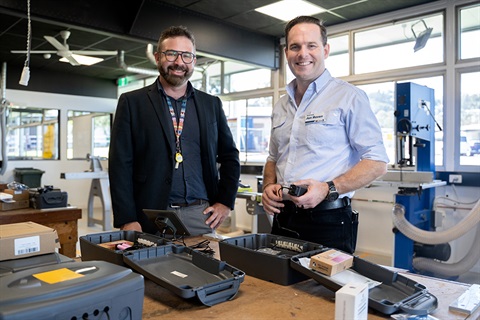Logan students to use AI tech to live-tweet local bird life
Published on 03 September 2025

Students from nine local high schools will use artificial intelligence to monitor and better understand Logan’s bird life thanks to a grant from Logan City Council.
The wildlife conservation project involves students building and operating special devices that use AI to listen to the tweets and calls of birds in their school grounds.
Students will use the data to build a bird species census for each school and then identify the tree species that will support native birds such as glossy black-cockatoos and little lorikeets.
Mayor Jon Raven said the two-year project was a great example of how technology and AI could be used to deliver real-world benefits.
“Artificial intelligence is already here. This project is embracing it and I can’t wait to see the results,” he said.
“The data from these monitors will be used to help schools choose what to plant to encourage native birds to improve their school attendance.
“Young citizen scientists are keen to take their learning beyond the classroom into nature, using modern technology to help improve their local environment.”
Project coordinators ENABLE Sustainability Network used funding from Council’s EnviroGrants program to buy microcomputers and other equipment that will support BirdNET-PI – an AI platform that can identify birds through calls and chirps in real time.
The pilot study also has the potential to track the noises of other animals such as greater and yellow-bellied gliders, koalas and frogs.
Yarrabilba State Secondary College student Glorie Nyamujangwa said the project would help his studies in ecology.
“It’s exciting to be constructing something for our school that will also help with learning, and in my Year 12 assessment next year,” he said.
“It’s exciting to have a program that could develop into the future for other students, and inspire more learning opportunities in biology.”
ENABLE Sustainability Network co-chair and Park Ridge State High School Associate Principal Stuart Douglas said the group aimed to increase bird populations over time.
“Our long-term aim is to use the information to plant more appropriate tree species at each school, based on the data we collect and in consultation with conservation experts,” he said.
“We’re hoping to see the planting result in greater bird visitors over the longer term as a direct result of the work the students are doing to identify species and improve their campuses.”
Schools involved include Beenleigh State High, Flagstone Community College, Kingston State College, Loganlea State High, Mabel Park State High, Park Ridge State High, Shailer Park State High, Woodstock Flexible Learning Centre and Yarrabilba State Secondary College.